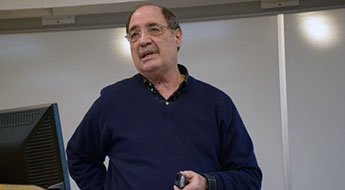Charles F. Manski
Board of Trustees Professor in Economics
PhD, Economics, Massachusetts Institute of Technology, 1973
Charles F. Manski has been Board of Trustees Professor in Economics at Northwestern University since 1997. He was formerly a member of the faculty at the University of Wisconsin-Madison (1983–98), the Hebrew University of Jerusalem (1979–83), and Carnegie Mellon University (1973–80).
Manski’s research spans econometrics, judgment and decision, and the analysis of public policy. He is the author of eight books, including Patient Care under Uncertainty (Princeton University Press, 2019), Public Policy in an Uncertain World (Harvard University Press, 2013) and Identification for Prediction and Decision (Harvard University Press, 2007), co-author of College Choice in America (Harvard University Press, 1983), and co-editor of four others.
Manski has been editor of the Journal of Human Resources (1991–94), co-editor of the Econometric Society Monograph Series (1983–88), member of the editorial board of the Annual Review of Economics (2007-13), and associate editor of the Annals of Applied Statistics (2006-10), Journal of Economic Perspectives (1986–89), Econometrica (1980–88), the Journal of the American Statistical Association (1983–85, 2002–04), and Transportation Science (1978–84).
He has served as director of the Institute for Research on Poverty (1988–91) at the University of Wisconsin-Madison, as chair of the Board of Overseers of the Panel Study of Income Dynamics (1994–98), and as chair of the Department of Economics at Northwestern University (2007-10). At the National Research Council, he has been chair of the Committee on Data and Research for Policy on Illegal Drugs (1998-2001), a member of the Board on Mathematical Sciences and their Applications (2004–07), the Committee on Law and Justice (2009-15), the Committee on Deterrence and the Death Penalty (2010–12), the Committee on Proactive Policing (2015–17), the Report Review Committee (2010–18), the Committee on National Statistics (1996–2000), the Commission on Behavioral and Social Sciences and Education (1992–98), the Committee on the Federal Role in Education Research (1991–92), the Committee on Research on Law Enforcement and the Administration of Justice (1985–87), and the Panel on Research on Criminal Careers (1983–86). Manski is an elected member of the National Academy of Sciences and an elected fellow of the Econometric Society, The American Academy of Arts and Sciences, the American Association for the Advancement of Science, the American Statistical Association, and the British Academy. He is a Distinguished Fellow of the American Economic Association.
Current Research
Policy Choice with Partial Knowledge of Treatment Response. Economists have long sought to learn the effect of a "treatment" on some outcome of interest, just as doctors do with their patients. A central practical objective of research on treatment response is to provide decision makers with information useful in choosing treatments. Often the decision maker is a social planner who must choose treatments for a heterogeneous population—for example, a physician choosing medical treatments for diverse patients or a judge choosing sentences for convicted offenders. But research on treatment response rarely provides all the information that planners would like to have. How then should planners use the available evidence to choose treatments? Manski’s research addresses key aspects of this broad question, exploring and partially resolving pervasive problems of identification and statistical inference that arise when studying treatment response and making treatment choices.
Selected Publications
Selected Books
Manski, Charles F. Patient Care under Uncertainty. Princeton University Press (2019).
Manski, Charles F. Public Policy in an Uncertain World. Harvard University Press (2013).
Manski, Charles F. Identification for Prediction and Decision. Harvard University Press (2007).
Manski, Charles F. Partial Identification of Probability Distributions. New York: Springer-Verlag (2003).
Selected Articles
Manski, C., J. Mullahy, and A. Venkataramani. 2023. Using measures of race to make clinical predictions: Decision making, patient health, and fairness. The Proceedings of the National Academy of Sciences 120(35): e2303370120.
Manski, C. 2023. Probabilistic prediction for binary treatment choice: With focus on personalized medicine. Journal of Econometrics 234(2): 647–63.
Sheyu, L., V. Litvin, and C. Manski. 2023. Partial identification of personalized treatment response with trial-reported analyses of binary subgroup. Epidemiology 34(3): 319–24.
Manski, C. 2023. Navigating uncertainty in immunotherapy regimens. NEJM Evidence 2(4). DOI: 10.1056/EVIDpp2300028
Decanio, S., C. Manski, and A. Sanstad. 2022. Minimax-regret climate policy with deep uncertainty in climate modeling and intergenerational discounting. Ecological Economics 201: 107552.
Manski, C. 2021. Econometrics for decision making: Building foundations sketched by Haavelmo and Wald. Econometrica 89(6): 2827–53.
Manski, C. and F. Molinari. 2021. Estimating the COVID-19 infection rate: Anatomy of an inference problem. Journal of Econometrics 220(1): 181–92.
Manski. C. 2020. Towards credible patient-centered meta-analysis. Epidemiology 31(3): 345–52.
Manski, C. 2019. Treatment choice with trial data: Statistical decision theory should supplant hypothesis testing. The American Statistician 73(S1): 296–304.
Manski, C. 2019. Communicating uncertainty in policy analysis. Proceedings of the National Academy of Sciences 116(16): 7634–41.
Manski, C. 2018. Credible ecological inference for medical decisions with personalized risk assessment. Quantitative Economics 9(2): 541–69.
Manski, C. and J. Pepper. 2018. How do right-to-carry laws affect crime rates? Coping with ambiguity using bounded-variation assumptions. Review of Economics and Statistics 100(2): 232–44.
Manski, C. 2018. Survey measurement of probabilistic macroeconomic expectations: Progress and promise. NBER Macroeconomics Annual 32(1): 411–71.


